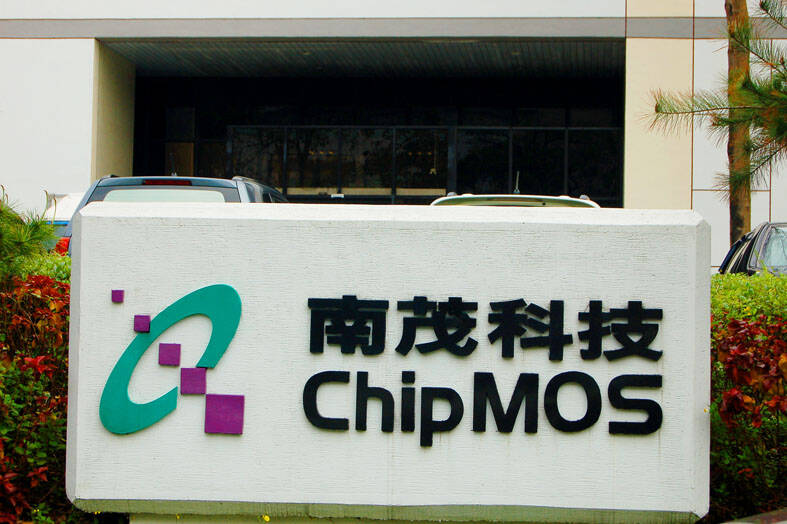Chip packaging services provider ChipMOS Technologies Inc (南茂科技) yesterday said it expects next year to be a promising one for the global memory industry, driven mainly by strong demand for chips used in artificial intelligence (AI) data centers.
The company’s upbeat forecast echoed the sentiment of local memorychip makers and memory module suppliers including Winbond Electronics Corp (華邦電子) and Phison Electronics Corp (群聯電子).
“Next year will be a good year for the memory [chip industry]. It will be a quite good year for high-bandwidth memory, [DRAM] DDR5, DDR4, NAND or for NOR flash,” ChipMOS chairman Cheng Chih-chieh (鄭世杰) said at an earnings conference.

Photo: Grace Hung, Taipei Times
ChipMOS’ memory packaging revenue grew 16 percent sequentially last quarter, an annual growth of 24.9 percent, Cheng said.
Memory-related business accounted for 48.9 percent of the company’s revenue last quarter, up from 45.3 percent in the previous quarter and 36.3 percent a year earlier. The company posted NT$6.14 billion (US$197.7 million) in overall revenue, the highest in about three years.
To meet customer demand, ChipMOS plans to moderately expand DRAM and flash memory packaging capacity through enhancing productivity of existing manufacturing equipment, Cheng said.
The company would be prudent about adding large-scale chip packaging capacity, unless it secures long-term supply agreements with new chip prices, he said.
ChipMOS is looking at raising prices again to pass on rising costs to customers, as the costs of gold and raw materials such as silicon substrates have been increasing, he said.
The company last quarter hiked prices by 5 to 8 percent, he added.
ChipMOS recorded a net profit of NT$352.2 million last quarter after booking a foreign exchange gain of NT$84 million, from a net loss of NT$533.1 million in the second quarter, when it recorded a foreign exchange loss of NT$690 million.
On an annual basis, net profit expanded 17.6 percent from NT$299.4 million, the company said.
Cheng said ChipMOS expects the growth momentum in the memory market to persist this quarter on the back of robust enterprise demand for DRAM and flash memory used in AI data centers.
Additionally, the number of memory chips installed on a single device is increasing, he said.
However, the driver integrated circuit (IC) testing and packaging business is expected to remain weak this quarter, following an end to front-loading demand in the TV and smartphone segments, the company.
Separately, high-speed data transmission chip designer ASMedia Technology Inc (祥碩) yesterday said it has secured a deal to design application-specific ICs for a second customer and expects the deal to generate a revenue stream in the second half of next year.
Advanced Micro Devices Inc (AMD) has been ASMedia’s only customer for years. ASMedia helps design motherboard chipsets for AMD desktop platforms.
ASMedia expects record revenue next year, company president Lin Che-wei (林哲偉) said.
Chip designing business accounted for about 60 percent of the company’s revenue in the third quarter. Its net profit surged 41 percent quarter-on-quarter to NT$1.58 billion. That represented an annual growth of 62 percent from NT$974 million.
Earnings per share jumped to NT$21.21 from NT$15.02 in the second quarter and NT$13.06 a year earlier.

Sweeping policy changes under US Secretary of Health and Human Services Robert F. Kennedy Jr are having a chilling effect on vaccine makers as anti-vaccine rhetoric has turned into concrete changes in inoculation schedules and recommendations, investors and executives said. The administration of US President Donald Trump has in the past year upended vaccine recommendations, with the country last month ending its longstanding guidance that all children receive inoculations against flu, hepatitis A and other diseases. The unprecedented changes have led to diminished vaccine usage, hurt the investment case for some biotechs, and created a drag that would likely dent revenues and

Global semiconductor stocks advanced yesterday, as comments by Nvidia Corp chief executive officer Jensen Huang (黃仁勳) at Davos, Switzerland, helped reinforce investor enthusiasm for artificial intelligence (AI). Samsung Electronics Co gained as much as 5 percent to an all-time high, helping drive South Korea’s benchmark KOSPI above 5,000 for the first time. That came after the Philadelphia Semiconductor Index rose more than 3 percent to a fresh record on Wednesday, with a boost from Nvidia. The gains came amid broad risk-on trade after US President Donald Trump withdrew his threat of tariffs on some European nations over backing for Greenland. Huang further

CULPRITS: Factors that affected the slip included falling global crude oil prices, wait-and-see consumer attitudes due to US tariffs and a different Lunar New Year holiday schedule Taiwan’s retail sales ended a nine-year growth streak last year, slipping 0.2 percent from a year earlier as uncertainty over US tariff policies affected demand for durable goods, data released on Friday by the Ministry of Economic Affairs showed. Last year’s retail sales totaled NT$4.84 trillion (US$153.27 billion), down about NT$9.5 billion, or 0.2 percent, from 2024. Despite the decline, the figure was still the second-highest annual sales total on record. Ministry statistics department deputy head Chen Yu-fang (陳玉芳) said sales of cars, motorcycles and related products, which accounted for 17.4 percent of total retail rales last year, fell NT$68.1 billion, or

HSBC Bank Taiwan Ltd (匯豐台灣商銀) and the Taiwan High Prosecutors Office recently signed a memorandum of understanding (MOU) to enhance cooperation on the suspicious transaction analysis mechanism. This landmark agreement makes HSBC the first foreign bank in Taiwan to establish such a partnership with the High Prosecutors Office, underscoring its commitment to active anti-fraud initiatives, financial inclusion, and the “Treating Customers Fairly” principle. Through this deep public-private collaboration, both parties aim to co-create a secure financial ecosystem via early warning detection and precise fraud prevention technologies. At the signing ceremony, HSBC Taiwan CEO and head of banking Adam Chen (陳志堅)